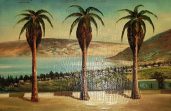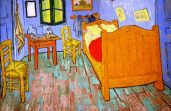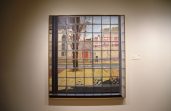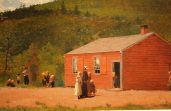My Name is Asher Lev
by
Chaim Potok
“I drew him sitting on the parkway bench in front of our apartment house. In the spring and early summer, and sometimes in the beginning weeks of autumn, he would sit on the bench with my mother on a festival afternoon. They would talk quietly together and I would scamper about. I was a child then and never really understood what they were saying. But I remembered their faces and gestures, the lowered eyes, the smiles the light brushing of fingers across an arm or shoulder. I remembered those moments on that bench, and now I drew them.
And I drew, too, the way my father once looked at a bird lying on its side against the curb near our house. It was Shabbos and we were on our way back from the synagogue.
‘Is it dead, Papa?’ I was six and could not bring myself to look at it.
‘Yes,’ I heard him say in a sad and distant way.
‘Why did it die?’
‘Everything that lives must die.’
‘Everything?’
‘Yes.’
‘You, too, Papa? And Mama?’
‘Yes.’
‘And me?’
‘Yes,’ he said. Then he added in Yiddish, ‘But may it be only after you live a long and good life, my Asher.’
I couldn’t grasp it. I forced myself to look at the bird. Everything alive would one day be as still as that bird?
‘Why?’ I asked.
‘That’s the way the Ribbono Shel Olom made His world, Asher.’
‘Why?’
‘So life would be precious, Asher. Something that is yours forever is never precious.’”
~ My Name is Asher Lev~
There are books which slowly draw you in, enticing you to turn the page; it may be several pages or even chapters before you commit to reading the entire tome, they are fine reads. There are others, however, that instantly command your attention; such was the case with My Name is Asher Lev by Chaim Potok, published in 1972, by Alfred A. Knopf, New York, New York.
I always begin my investigation, of a new book, with the pages that precede the first line of text. I want to know when and where my book was published, especially as I buy so many previously owned and appreciated books. I want to know who read the book before me; did they leave me any notes or pieces of paper which tell me who they were? Did the author have something to say before I read their work? I find I have a first edition, with My Name is Asher Lev; I will not part with the book, so why does it matter? I do not know why, but it makes me happy to know it is a first edition.
There are no long forwards, list of acknowledgments, or dedications; but there is a quote: “Art is a lie which makes us realize the truth.” Picasso – just Picasso, no Pablo – Potok has laid down an expectation for his readers, I do like that too. I instantly think I will use this quote on my sidebar, it is commanding and filled with philosophical possibilities that could lead to hours of conversation. I am smitten; My Name is Asher Lev will be devoured. I read it in as close to one sitting as the world allows me – and I will not be disappointed!
I do not always embrace fiction with the same joy as non-fiction, but when you find a beautifully written, poetic, and powerful piece of non-fiction, it transports you into the author world, and with any luck, it will transform you. My Name is Asher Lev offered me both.
This is a melodic book, which makes you feel like you are listening in on the conversations between the principal character, Asher, who we meet as a young child, and watch grow into manhood, and those in his world which matter most, including his parents, rabbi, and teachers. Just as lively, are the exchanges within Asher, as he struggles, to come to terms with who he is in his family, his place in their history, and with the ideas, desires, and needs within himself. He is a part of a community with a story thousands of years old, and yet he is a man of his generation with a talent and innate spirit which is at odds with the history and people he truly loves.
There is a simplicity in the boy’s dialogues which brings clarity to years old conflicts and leaves you feeling as though you too are standing in his apartment window, watching and waiting for your world to come together. I loved this book; and I loved that the moment I finished it I was able to rush to my dear friend Fran, who I was certain would have read My Name is Asher Lev and would joyfully discuss it with me; I was right, she is perfect.
My sojourn in Tamarac, where I was privileged to partake in so many exchanges, which could have easily been included in this book, has multiplied my appreciation of Mr. Potok in unfathomable ways.
“Later, I walked in the snow to Yudel Krinsky’s store. I found him behind the counter, sorting paintbrushes. He was alone in the store and was surprised to see me.
‘In such a storm you walk to the store? You should go straight home.’
I did not want to go home. It was warm in the store and there was that smell of new paper and pencils. I took off my coat and galoshes. Yudel Krinsky waved a brush at me.
‘Outside is like Siberia. You are sure you should not go home?’
‘I can stay a little while,’ I said.
‘Then help me with the brushes,’ he said. ‘A Jew should not only talk, he should also do.’”
Oh, I sighed reading those words. For a moment, I imagined my dear friend Phil, who like Asher, too was a brilliant painter. I thought of Phil walking into the little stationery store, and inquiring about Siberia and life, as he helped sort paintbrushes.
This is a book about conflict, acceptance, atonement, and peace; at least for me, a fitting book for this time of year. I wish my Jewish friends and family L’Shanah Tovah Tikatevu, May you be inscribed for a good year; and Tzom kal, May you have an easy fast.











